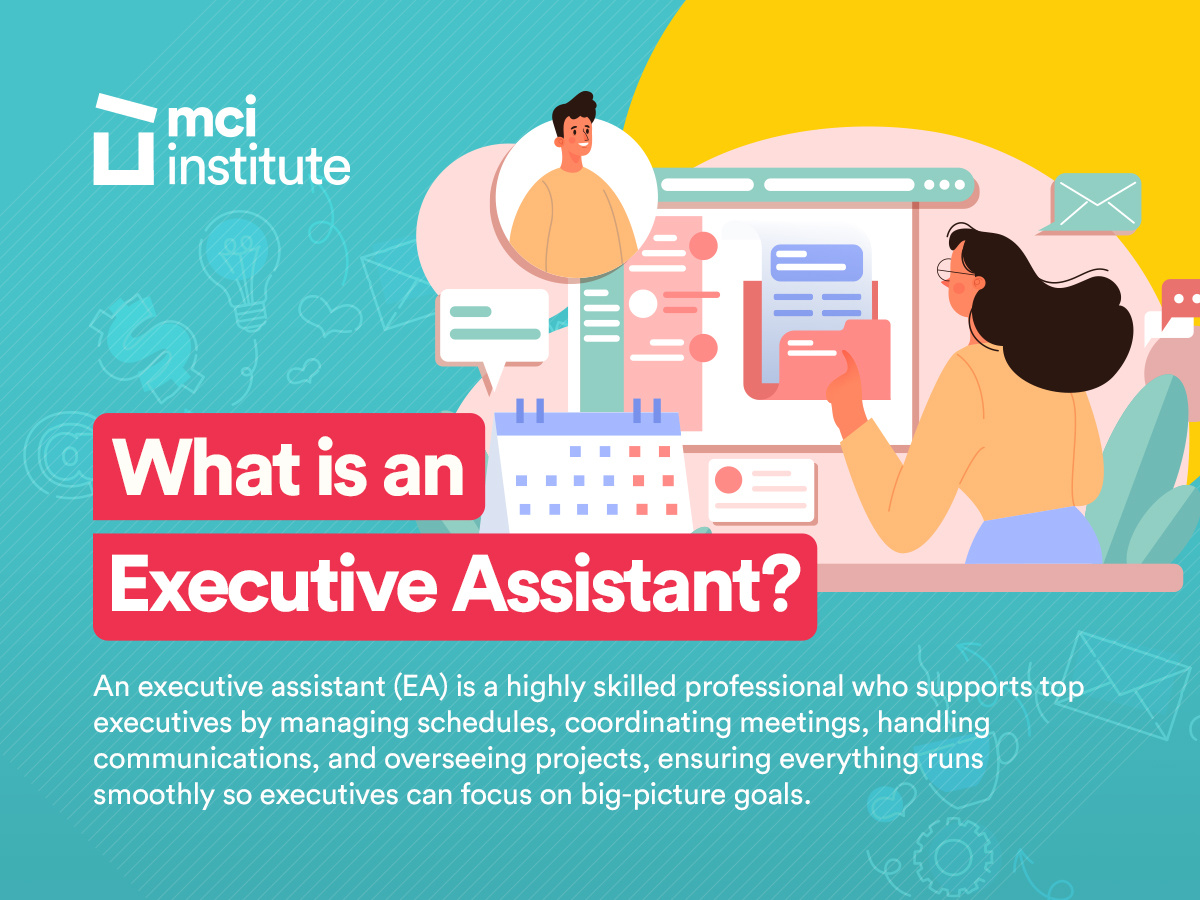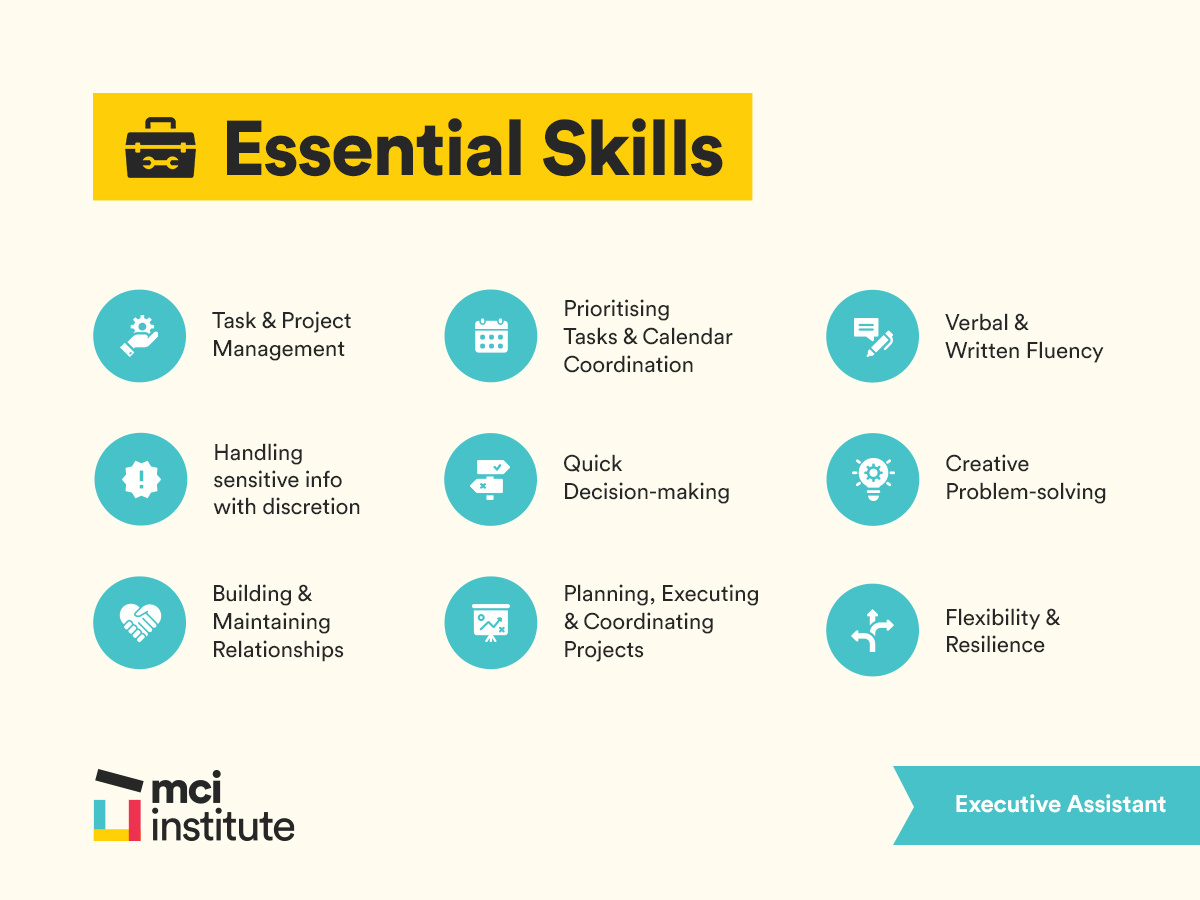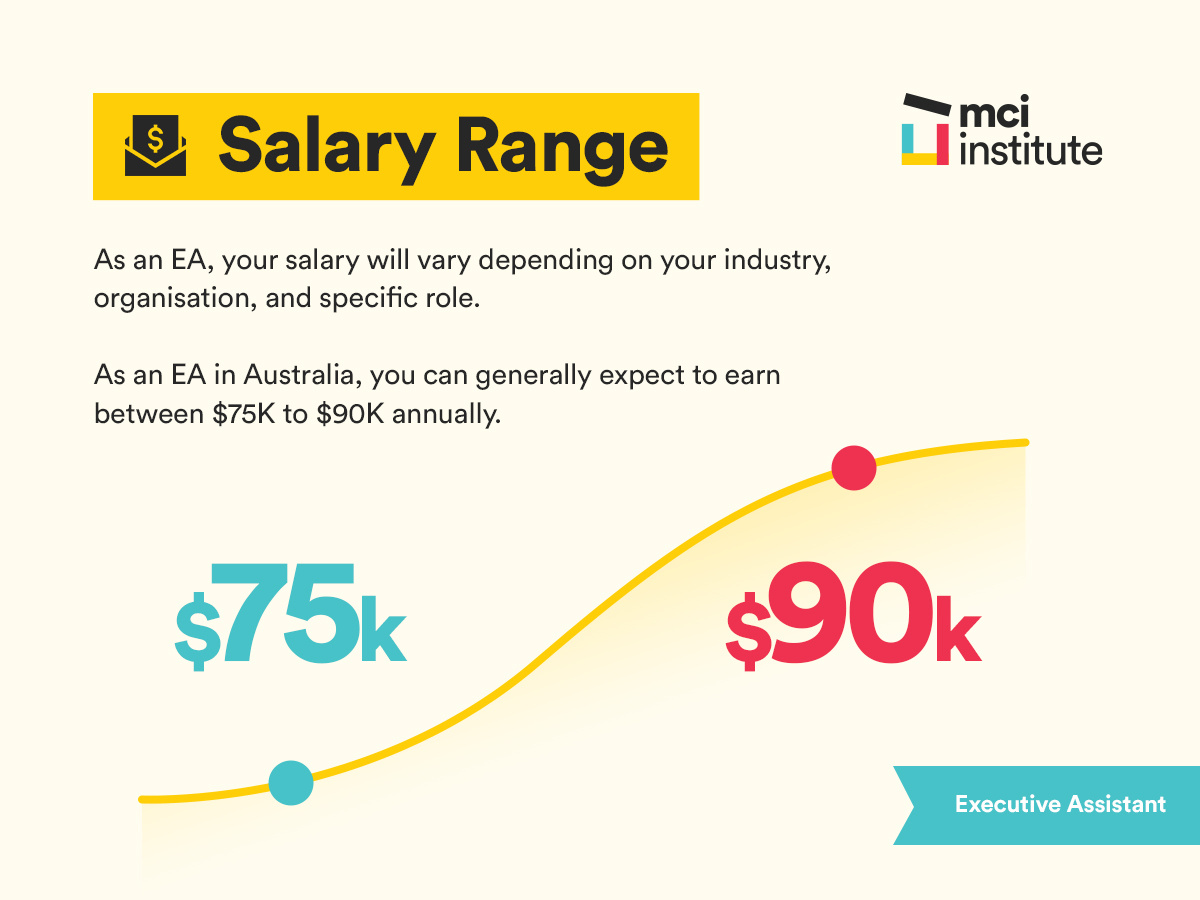Imagine having the power to streamline an executive’s day, making critical decisions on their behalf and ensuring the entire office runs like a well-oiled machine. That’s the life of an EA.
Executive assistants (EAs) are the unsung heroes behind thriving businesses. They boost productivity by taking care of the daily grind, allowing executives to zero in on strategic goals. By keeping everything running smoothly, EAs play a key role in fostering communication, improving efficiency, and driving the success of their teams and companies.
What is an executive assistant?

An executive assistant (EA) is a highly skilled professional who provides comprehensive administrative support to top executives. They manage schedules, coordinate meetings, handle communications, and oversee special projects–essentially the executive’s right hand.
With stellar organisational and communication skills, EAs make sure everything runs smoothly, allowing executives to focus on the big-picture goals.
Executive assistants vs. personal assistants: what’s the difference?
While both EAs and personal assistants (PAs) provide crucial support, their roles differ in scope and responsibility.
EAs typically support top executives by managing complex schedules, coordinating high-level meetings, handling strategic projects, and facilitating communication across departments. Their role often involves significant decision-making and strategic planning.
PAs focus more on day-to-day personal and professional tasks for their employers, like organising personal schedules, making travel arrangements, and handling personal errands. PAs tend to have a more direct and personal relationship with their employers, while EAs engage more with broader organisational and business-related activities.
Executive assistant responsibilities
Calendar management
This is the cornerstone of an EA’s role, ensuring the executive’s time is optimised for maximum productivity.
Responsibilities include:
- Scheduling and organising meetings, appointments, and events to keep their executive’s day structured and efficient.
- Prioritising and managing time effectively to avoid conflicts and ensure critical tasks are addressed promptly.
Communication management
Effective communication management is crucial for maintaining seamless interactions, both within and outside the organisation.
Responsibilities include:
- Handling incoming and outgoing correspondence, including emails, phone calls, and letters to ensure timely and accurate communication.
- Acting as a liaison between the executive and internal/external stakeholders to make sure messages are conveyed clearly and promptly.
Travel coordination
Travel coordination ensures that the executive’s travel plans are smooth, cost-effective, and efficient.
Responsibilities include:
- Planning and booking travel arrangements, including flights, accommodations, and transportation, to meet the executive’s needs and preferences.
- Preparing detailed travel itineraries to ensure the executive has all necessary information at their fingertips.
Meeting prep and support
This is essential for productive and organised meetings.
Responsibilities include:
- Preparing agendas, taking minutes, and following up on action items to ensure meetings are focused and outcomes are tracked.
- Ensuring meeting materials are organised and distributed in advance to all participants for effective discussions.
Project management
Project management involves coordinating and overseeing special projects to achieve desired outcomes efficiently.
Responsibilities include:
- Coordinating and managing special projects, ensuring timely completion and alignment with organisational goals.
- Collaborating with various departments to achieve project goals and foster a cohesive working environment.
Document management
This is critical for maintaining accurate and accessible records.
Responsibilities include:
- Organising and maintaining confidential files and records to ensure data integrity and easy retrieval.
- Preparing reports, presentations, and other documents as needed to support the executive’s activities and decision-making.
Expense management
This ensures financial accuracy and accountability.
Responsibilities include:
- Managing and processing expense reports to keep financial records accurate and up to date.
- Ensuring all financial records are accurate and up-to-date to support budget management and financial planning.
Office management
Office management contributes to a productive and well-organised work environment.
Responsibilities include:
- Overseeing office operations and procedures to ensure efficiency and organisation.
- Managing office supplies and ensuring the work environment is efficient and well-organised, fostering a positive and productive workplace.
Relationship building
Relationship building is key to fostering strong professional connections and a positive work environment.
Responsibilities include:
- Building and maintaining strong relationships with internal and external contacts to support the executive’s network and influence.
- Representing the executive in a professional manner at all times to uphold the organisation’s reputation and build trust.
Confidentiality and discretion
Confidentiality and discretion are paramount for maintaining trust and integrity, especially when you’re dealing with sensitive information.
Responsibilities include:
- Handling sensitive information with the utmost confidentiality to protect the executive and organisation.
- Exercising discretion in all aspects of the role to ensure professional integrity and confidentiality are maintained at all times.
Why become an EA?
- Professional growth and development: You’ll gain a broad range of skills, from organisational and time management to communication and problem-solving. You’ll also have access to learning opportunities through training and certifications.
- Career advancement: Opportunities to progress to higher roles like senior executive assistant, chief of staff, or operations manager.
- Networking opportunities: Build strong relationships with top executives and influential professionals and enhance your professional network–which will open doors to future career opportunities.
- Variety and challenge: You’ll engage in diverse tasks and projects, meaning no two days are the same. You get to enjoy a dynamic work environment that keeps you engaged and motivated.
- Competitive salary and benefits: You’ll generally enjoy good compensation packages, often including bonuses, healthcare, and retirement plans. You’ll also often get additional perks like travel, professional memberships, continued education, and more.
- Key role in organisational success: Directly contribute to the efficiency and success of top executives and the organisation as a whole.
- Insight into business operations: Gain a comprehensive understanding of business operations and executive decision-making processes, and get valuable insight into the business world.
- Enhanced problem-solving skills: You’ll regularly tackle challenges that require creative and strategic solutions, which will improve your ability to think on your feet and handle complex situations effectively.
- Job stability and demand: There’s a high demand for skilled EAs across various industries, meaning job security and a strong market for your skills.
- Personal fulfilment: It can feel rewarding to support and empower top leaders. You can make a big impact on the lives of executives and the success of the organisation.
Essential executive assistant skills

Organisational skills
- Task and project management: Ability to manage multiple tasks, projects, and priorities efficiently, keeping everything on track and deadlines met.
- Structured systems: Proficiency in creating and maintaining organised systems for files, schedules, and information, ensuring easy access and retrieval.
- Paying attention to detail: Meticulous approach to ensuring that every detail is accounted for, reducing errors and improving overall productivity.
Time management skills
- Prioritising tasks: Expertise in identifying and focusing on the most critical tasks to ensure timely completion and avoid bottlenecks.
- Calendar coordination: Skill in managing both the executive’s and own time, scheduling meetings and appointments to maximise productivity.
- Deadline adherence: Commitment to meeting deadlines, ensuring that projects and tasks are completed on time and to the highest standard.
Communication skills
- Verbal and written fluency: Ability to articulate complex administrative tasks and processes clearly to both internal teams and external stakeholders.
- Active listening: Key for understanding the needs and concerns of colleagues and clients to facilitate effective operations.
- Presentation skills: Essential for presenting reports, strategic plans, and operational changes persuasively to management and teams.
Attention to detail
- Accuracy: Strong focus on precision in all aspects of work, from data entry to report preparation.
- Thoroughness: Commitment to thoroughly checking work to catch and correct errors or inconsistencies.
- Quality control: Maintaining high standards of quality across all tasks and projects.
Technical proficiency
- Office software: Competency with Microsoft Office Suite for daily tasks.
- Project management tools: Familiarity with tools like Asana, Trello, or Slack to manage projects and team communication.
- Scheduling software: Proficiency in using scheduling tools like Google Calendar or Outlook Calendar to coordinate meetings and events.
Discretion and confidentiality
- Sensitive information management: Ability to handle confidential information with the utmost care and discretion.
- Trustworthiness: Commitment to maintaining confidentiality in all matters, protecting the executive and the organisation.
- Professional integrity: Upholding high ethical standards in all interactions and tasks.
Interpersonal skills
- Relationship building: Strong ability to build and maintain positive relationships with colleagues, clients, and stakeholders.
- Networking: Effective networking skills to connect with a broad range of professionals and enhance the executive’s influence.
- Collaboration: Ability to work well with others, fostering a cooperative and productive work environment.
Problem-solving
- Quick decision-making: Ability to make swift and effective decisions to address issues as they show up.
- Creative thinking: Applying creative solutions to improve processes and solve problems.
- Resourcefulness: Using available resources efficiently to overcome challenges and achieve goals.
Adaptability
- Flexibility: Ability to handle changing priorities and new challenges with ease.
- Resilience: Maintaining performance and composure in a fast-paced and dynamic work environment.
- Open-mindedness: Willingness to learn and adapt to new tools, technologies, and methods.
Project management
- Planning and execution: Competence in planning, executing, and overseeing projects to successful completion.
- Coordination: Coordinating resources, timelines, and deliverables to keep projects on track.
- Goal alignment: Ensuring that projects align with organisational goals and objectives.
Financial acumen
- Budget management: Understanding of budgeting and cost management to ensure financial efficiency.
- Expense reporting: Ability to manage and process expense reports accurately.
- Financial tracking: Ensuring that all financial transactions are recorded and tracked properly.
Customer service
- Support and service: Strong focus on providing excellent support and service to executives and stakeholders.
- Patience: Strong focus on providing excellent support and service to executives and stakeholders.
- Problem resolution: Ability to resolve issues quickly and in a way that works for all parties involved.
Leadership and initiative
- Project leadership: Capability to lead projects and tasks with minimal supervision.
- Proactive approach: Identifying needs and implementing solutions proactively.
- Influence: Using influence to motivate and guide others towards achieving goals.
Pathways to becoming an executive assistant
Formal education
Aspiring EAs typically start by pursuing the relevant qualifications. Many opt for a Certificate III in Business Administration or a Certificate IV in Business Administration, which provide a solid foundation in administrative principles, office management, and organisational skills. These programs focus on practical skills needed for the role, like document management, communication, and software proficiency.
You might also choose to pursue a Bachelor’s degree in business, management, or a related field. These degrees offer a broader understanding of business principles, strategic management, and advanced administrative skills, which can be an advantage for higher-level EA positions.
Professional experience
Getting some practical experience through entry-level admin roles is a crucial step towards becoming an EA. Positions like admin assistant, office coordinator, or personal assistant offer opportunities to develop essential skills in a real-world setting. These roles provide hands-on experience in managing schedules, coordinating meetings, and handling communications – all fundamental to the EA role.
Internships are also great to get experience and insights into the role of an EA. These opportunities allow aspiring EAs to learn from seasoned professionals, build a professional network, and gain mentorship
Professional development
If you’ve already got a degree or you’re looking to further grow your career, continuing education is key. But that doesn’t just mean getting more qualifications or certifications – it can be as simple as attending industry-specific workshops and seminars. These events help keep skills up-to-date, ensure compliance with the latest business practices and technologies, and offer opportunities for professional growth and networking.
Networking
Joining professional associations provides access to a wealth of resources, networking opportunities, and professional development courses. Membership in these associations can be truly invaluable for career growth and staying informed on industry trends.
Networking through events, conferences, and even social platforms like LinkedIn can lead to job opportunities and career advice. Building connections within the fiel helps in understanding the evolving demands of the role and finding mentors and peers who can offer support and guidance.
Executive assistant salary

As an EA, your salary will vary depending on your industry, organisation, and specific role.
As an EA in Australia, you can generally expect to earn between $75K to $90K annually.
Executive assistant resume tips
If you’re looking at executive assistant job descriptions and applying for roles, there are a few things to keep in mind when tailoring your resume.
- Customise your resume to EA jobs. Focus on the specific skills and experience relevant to supporting high-level executives.
- Emphasise roles where you supported C-suite executives. Detail your responsibilities in managing calendars, organising meetings, and coordinating travel.
- List skills crucial for an EA. Include things like advanced organisational skills, exceptional time management, strong communication abilities, and high levels of discretion.
- Quantify your achievements. Use specific numbers to demonstrate your impact, such as ‘managed scheduling for a team of 10 executives, reducing conflicts by 30%.’
- Detail your technical proficiency. Make sure to list all of the programs relevant to working in an EA role.
- Show problem-solving skills. Describe instances where you resolved scheduling conflicts, streamlined office procedures, or handled unexpected issues effectively.
- Demonstrate interpersonal skills. Highlight your ability to build strong working relationships with executives, team members, and external partners.
Executive assistant interview questions
It’s hard to predict just how an interview will go, but here are some potential questions to get prepped and understand the kinds of things you might be asked.
- How did you manage the schedules and priorities of the executives you supported?
- How do you prioritise tasks when managing multiple executives' schedules?
- Can you give an example of how you handled a high-pressure situation?
- How do you maintain confidentiality in your role?
- How do you handle unexpected changes or disruptions to the executive’s schedule?
- Can you give an example of how you improved an organisational process in your previous role?
Take the next step in your EA career
Ready to start your career as an executive assistant, or looking to improve your EA skills for some growth opportunities? Our online business administration courses are the first step in hitting those goals. Check out our certificates and diplomas and enrol today!Excited to showcase the role of a human resources manager on your website? Go ahead and embed this infographic with ease! Just copy and paste the HTML code provided below into your site's code, and you're all set to share this insightful visual with your audience.

.png?width=113&name=MCIinstitute_RGB_Color_Black-01%20(2).png)


